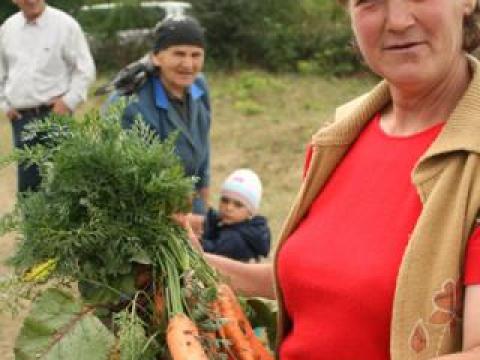Georgia’s farmers impacted by conflict get head start on harvest

The damage inflicted by the August conflict over South Ossetia had far reaching consequences for those working in the agricultural sector, with lost production and markets impacted by displaced populations exacerbating a vulnerable food security situation in the country.
Some 50 training sessions focusing on vegetable planting and growing techniques were geared to enhancing vegetable production and improving food security during the post-conflict recovery period.
Italian Ambassador, H. E. Mr Vittorio Sandalli and Governmental representatives listened in on one of the training sessions held in the village of Ditsi in Shida Kartli, followed by a visit to one of the demonstration plots arranged by World Vision Georgia.
Today I am witnessing the successful consequences of this joint project which encourages us even more to work in the long-term in Georgia “After last year’s donor conference the Italian government was the first to send immediate financial aid to Georgia,” stated the Ambassador. “Today I am witnessing the successful consequences of this joint project which encourages us even more to work in the long-term in Georgia”, he said.
“The training is very informative for farmers,” said 32-year-old farmer, Shavleg Markozashvili. “Farmers were informed about the new methods of planting and growing instructions which is most effective for enhancing vegetable production. Today the trainers introduced us to the basics of social marketing and the methods of food conservation,” he added.
World Vision proposes to provide house holds from conflict affected areas with not only training on the most appropriate agricultural best practices but also to ensure that they have access to markets and knowledge of how to put any surplus harvest to the best possible use.
“I am excited to see the local farmers’ interest in participating in this project. Our organisation will support and provide all the necessary consultations on agricultural issues to the communities in Shida Kartli villages in order to improve the social and economic conditions of the local population affected by war”, said Vano Grigolashvili, World Vision’s Humanitarian & Emergency Affairs (HEA) and Livelihood Development Programme Director.
Demonstration plots were established in nine villages in Shida Kartli, drip irrigation systems were installed on eight plots and agronomists helped local farmers to plant the four different varieties of vegetables provided to them using the new methods of planting.
Some 50 training sessions focusing on vegetable planting and growing techniques were geared to enhancing vegetable production and improving food security during the post-conflict recovery period.
Italian Ambassador, H. E. Mr Vittorio Sandalli and Governmental representatives listened in on one of the training sessions held in the village of Ditsi in Shida Kartli, followed by a visit to one of the demonstration plots arranged by World Vision Georgia.
Today I am witnessing the successful consequences of this joint project which encourages us even more to work in the long-term in Georgia “After last year’s donor conference the Italian government was the first to send immediate financial aid to Georgia,” stated the Ambassador. “Today I am witnessing the successful consequences of this joint project which encourages us even more to work in the long-term in Georgia”, he said.
“The training is very informative for farmers,” said 32-year-old farmer, Shavleg Markozashvili. “Farmers were informed about the new methods of planting and growing instructions which is most effective for enhancing vegetable production. Today the trainers introduced us to the basics of social marketing and the methods of food conservation,” he added.
World Vision proposes to provide house holds from conflict affected areas with not only training on the most appropriate agricultural best practices but also to ensure that they have access to markets and knowledge of how to put any surplus harvest to the best possible use.
“I am excited to see the local farmers’ interest in participating in this project. Our organisation will support and provide all the necessary consultations on agricultural issues to the communities in Shida Kartli villages in order to improve the social and economic conditions of the local population affected by war”, said Vano Grigolashvili, World Vision’s Humanitarian & Emergency Affairs (HEA) and Livelihood Development Programme Director.
Demonstration plots were established in nine villages in Shida Kartli, drip irrigation systems were installed on eight plots and agronomists helped local farmers to plant the four different varieties of vegetables provided to them using the new methods of planting.
Share